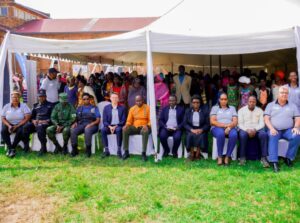Enhancing the collective understanding of environmental legal and policy frameworks for CSOs
In a bid to enhance the capacity of Civil Society Organisations (CSOs) to effectively engage with and contribute to environmental advocacy, The Great Lakes Initiative for Human Rights and Development (GLIHD) organised a capacity building session for stakeholders to understand the environmental legal and policy framework and advocacy.
The training, which happened on February 28, 2024, brought together civil society organisations such as The Future in Our Minds – FIOM Rwanda, We Do Green, Tubibe Amahoro, Rwanda Development Organization (RDO), Rwanda Climate Change and Development Network (RCCDN), Global Initiative for Environment and Reconciliation (GER) among others.
Areas discussed included laws regulating conservation of different environmental components, national environment and climate change policy, ratified multilateral environmental agreements, policy and legal framework in Rwanda.
Rwanda has made remarkable and commendable efforts in environment conservation. Different laws and regulations have been adopted and are playing a huge role in line with environment conservation. In addition to that, specific institutions that intervene in environment conservation are in place.
Nonetheless challenges still prevail and these include; population growth, poverty, reliance on fossil fuel use, overexploitation of resources, among others. And this points to the need for different parties to engage in achieving the desired goal of having a continent respectful of its environment, ecologically conscious with green economy and green energy, as per the AU Agenda 63.
According to the presentation shared by Dr Marie Rose Turamwishimiye, a Lecturer at the School of Law, University of Rwanda and Director of the University Centre for Legal Aid and Mediation (CLAM), issues that need special attention include waste management, climate change, land degradation, air pollution, management of mines and quarry sites, management and use of energy resource, water and wetlands degradation.
In her remarks, Deputy Executive Director of GLIHD, Vestine Umulisa, extended her warmest greetings to all participants, expressing her profound gratitude to all for gracing the occasion with their presence.
“I would like to acknowledge the presence of representatives from various civil society organizations, government institutions, and esteemed development partners. Your diverse perspectives enrich the learning experience and contribute to the success of this initiative,” she said.
She went ahead to reflect on the aim of the workshop reminding all stakeholders to be mindful of the shared goal which is ‘to enhance the collective understanding of environmental legal and policy frameworks.’
“This workshop is a testament to our commitment to building capacity, fostering collaboration, and amplifying advocacy impact in the realm of environmental issues. In the spirit of recognizing the value of collaboration, we extend our deepest appreciation to the Norwegian People’s Aid (NPA) for their generous support in making this workshop possible through the 2024 “Public Policy Information Monitoring and Advocacy” (PPIMA) project. Their commitment to fostering positive change and sustainable development is instrumental in empowering civil society organizations like ours.” Umulisa said.
In his closing remarks, Dr Tom Mulisa, Executive Director of GLIHD, Underscored the relevance of partnerships when it comes to tackling issues related with environmental conservation.
“This is just the beginning, as people who work on environment, there is a lot to be done and of course, there are activities we will do jointly as partners.”


